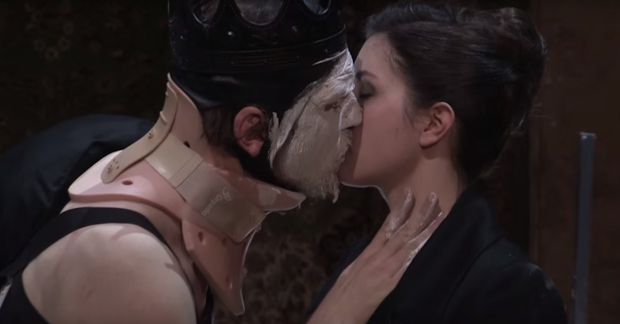Matt Trueman: British theatre has come to revere German theatre
Our critic spent a week at the annual Theatertreffen festival in Berlin

In recent years, British theatre – at least, a certain segment of it – has come to revere German theatre. The influence has been plain to see, as directors, in particular, have turned against literal representation towards the abstracted imagery of 'regietheater'. You think of Joe Hill-Gibbins' Changeling at the Young Vic, with its dance parties and jelly fights; of Ellen McDougall's Henry the Fifth at the Unicorn, balloons standing in for armies; of the Lyric Hammersmith's Secret Theatre company, chucking legs of lamb around and chowing down on watermelons.
There's often an emphasis on the realities of performance, rather than the mimetic. In no time at all, elements of that have run right through to the West End, where Kit Harrington and co. are currently scoffing pizzas, smearing themselves in ketchup and getting their kit off in Jamie Lloyd's Doctor Faustus.
What's curious, though, is how little actual German theatre has come to this country in that time – most of it directed by the Schaubuhne's Thomas Ostermeier. His Doll's House swapped Ibsen's door slam for a gun shot; his muddy, looping Hamlet and his town hall Enemy of the People, with its real-life debate. At the Lyric, Three Kingdoms, directed into a foxy frenzy by Sebastian Nübling, left a generation of young theatremakers craving more – and many have been out to Berlin themselves. Beyond that, though, not a lot: Herbert Fritsch's technicolour Murmel Murmel and Christoph Marthaler's Meine Faire Dame, both in Edinburgh. That is, I think, it, though word is both Nübling and Nicholas Stemann are developing work at the Lyric.
Of course, it's more complex than that. As Andrew Haydon has written, the exchange runs both ways: British new writing enlivened German theatre in the late nineties, and British artists – playwrights like Dennis Kelly and Simon Stephens, directors like Katie Mitchell and Ramin Gray – regularly premiere work in Germany.
However, it's interesting to note what stands for German theatre over here. Ostermeier aside, British audiences mostly see the style refracted through homegrown work – ideas and aesthetics picked up, magpie-like, by British artists. Having just spent a week in Berlin, for its annual Theatertreffen festival, I was fascinated to see both the range and the difference of the real thing. Fritsch's highlighter clowning (der die mann) sat next to a relatively straightforward updated Ein Volksfiend by Stefan Pucher – theatrically inert, politically pin-sharp as it skewered the false democracy of a networked society.
Theatertreffen brings the "most remarkable" German language theatre to Berlin over two weeks. Were something similar to happen here, it could be a big boon for regional theatre. Inclusion is the biggest accolade in German theatre, and most selected shows come from outside of the capital. But Theatertreffen depends on Germany's rep system. With shows still playing in their home theatres, there's no need to bring a disparate company of freelancers back together and get the set out of (expensive) storage. It would never work over here.
What you realise is how different German acting is: how dislocated performances can be without the through-line of psychology. Watching Thomas Ostermeier's Richard III, coming to Edinburgh this summer, you end up with a string of (brilliant) images: more a thesis about Richard, than an embodiment of him. Lars Eidinger – Ostermeier's Hamlet – starts as a clownish figure, strapped into his deformities, railing into a boxing ring microphone, lusting for power and for women. He gets suited and booted – "thus I clothe my naked villainy" – and ends, almost in drag, as a kind of heirless Elizabeth I figure, in a corset and a cream-cheese face-mask. It's Richard refracted – and, being a character piece of a play, there are gains and losses.
When the images are good, regietheater is very, very good. When they're not, as in Yael Ronan's scrap-metal staging of Henrich von Kleist's Kolthaas, updated to swap a righteous horse dealer for an eco-conscious cyclist in a world of cars, it quickly loses momentum and interest.
At it's best, however, regietheater really is remarkable. Karin Beier's Schiff der Träume (And The Ship Sails On) from the Schauspielhaus Hamburg was truly remarkable. A show of two halves, it follows an orchestra whose conductor has died. His last will insists they sail his ashes into the Aegean, and play his masterwork, "Human Rights Symphony IV" – a pretentious, discordant wail with a percussionist in flippers and a snorkel. The first half sends up cosmopolitan culture in a whirlpool of German theatre tropes (nudity, tick; balloons, tick; artistic references, tick, tick, tick), as the musicians enjoy the cruise ship's five-star hospitality. (Pike vagina canape, anyone?) It's a critique that argues such art is elitist, introspective, individualistic, even, fascistic – all with a delirious, skittering comedy.
Half-way though, however, five black men walk through the all-white orchestra, unexplained and unannounced. The CS Europe answers a distress call from another boat and, in line with maritime law, takes 79 African refugees on board. The five men proceed to take over the show, imposing a completely different sensibility – boisterous, direct, peacocking, jovial – and speaking different languages. It's a remarkable feat of dramaturgy; one that turns a critical eye on itself, puts its politics into practice and pushes its content through into form.












